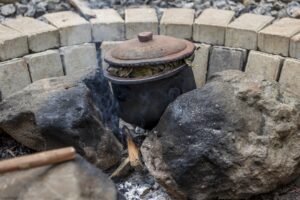The Elgon region is a tourism hub thanks to over 1000 waterfalls, among other attractions, that draw in thousands of tourists per year.
Apart from these natural wonders of Elgon that never cease to have visitors spell-bound, the region boasts a rich culture of the Bamasaba and the mountain ranges produce one of the finest coffee types- the Arabica.
To better tourists’ experiences in the region while conserving the environment, improving communities and respecting the culture, tour firms such as Wanale Falls Lodge under the Casa Safaris and Lodges company have established products that foster sustainable tourism.
“Here at Wanale Falls Lodge, we have key products that are dependent on sustainable tourism. If it impacts on the people, is sensitive about the environment and respects the culture, it is sustainable tourism. We have culinary tourism, coffee experience and environmental conservation,” says Saleh Naminya, CEO Casa Uganda Safaris.
Naminya notes that culinary tourism is majorly done by the women; mothers and young ladies while the coffee experiences are handled by youths trained under the tourism product development initiative.
“Under conservation, we make sure that every tourist who comes around is able to plant a tree or two as a move towards conserving mother nature. These three elements combined, we have the community benefitting from rendering service to the tourists, we get to showcase and preserve our culture, conserve the environment while marketing Elgon as a tourist destination,” he adds.
The people involved in product development, Naminya says, earn money which they in turn use in their savings groups to better their personal lives and improve the welfare of their families.

From the garden to the mug; Coffee Experience
Wanale Falls Lodge welcomed me with nothing short of a grand promise for a culinary feast, but first, a coffee to accompany the light showers.
The earthy aroma depicts the dark brown coffee with a flimsy oil coating dancing in the mug cradled in my hands. It’s a rainy afternoon at Wanale Falls Lodge in Bungokho, Mbale.
I sat by the alcove in a heartbreakingly low lounge wooden chair (devoid of cushions, I should add), craving some peace and quiet away from the main dining table where my colleagues helped themselves to roasted peanuts, washing the chunk down with freshly brewed coffee.
Gazing at the hill through intervals of raindrops, I appreciated Ugandan weather and the coffee warming my hands. Flashes of the coffee grinding process I had witnessed earlier flooded my mind and every sip meant more than just the rich taste of the Arabica.
“All the coffee we use here is got from the communities. That’s one of the ways we contribute to the betterment of the locals – buying produce from them,” Naminya says.
The trend of eco villages, lodges and farms giving tourists and travelers first hand experiences with processes that are otherwise ringfenced for the professionals is a win for the tourism industry.
One of the tour packages offered by Wanale Falls Lodge is the coffee experience; from the coffee garden where one is taken through the propagation, transplanting, cherry picking and drying to the fun bit of roasting to the desired degree and finally, brewing a coffee and sipping it by the roaring river.
A tourist once wrote “Once you carry that bag on your back and bend through the lanes picking tea leaves in western Uganda, every cup of tea becomes a blessing no matter where you have it from.”
Likewise, once you have carefully picked that red cherry from the coffee tree and roasted it, the coffee not only quenches your caffeine thirst, every sip is much more meaningful.

Not your ordinary bamboo shoot; Culinary tourism
It would be blasphemy to visit the land of Bamasaba and not try the traditional sauce – the Malewa.
Those who have tasted Malewa – dried bamboo shoots – say it’s that dish you move all the way across town for, in a particular diner by the corner.
For the two times I have tasted this delicacy, I have worshipped at the altar of women whose hands cut through each strip of the dried shoot that mimics a banana fiber, transforming each piece into a chewy bite – reminds my taste buds of dry mushrooms in peanut paste and smoked fish pasted just the same.
“We use culinary tourism to showcase our culture in terms of the food we eat as a key aspect in the culture of the Bagisu. At Wanale Falls Lodge, we give you a hands-on experience as the mothers prepare the food. Tourists are able to peel their own matooke, prep the malewa and make the delicacy,” Naminya says.

Décor with a touch of African Fabric
The accommodation facilities at Wanale Falls Lodge are intentionally decorated with fabric that reminds you of home.
From the stripped Kikoyi to the checkered Nakatukok (Karamojong draping sheet), the beds are neatly tucked, the tinge of color bringing vibrance to the white bedding sets. The same is lined at the bottoms and tops of curtains.
Mug rugs are made of the biodegradable banana fiber and the furniture maintains a rustic, natural look.
These fascinating pieces are made by skilled women who collaborate with Wanale Falls Lodge under Casa Safaris and Lodges, a tour company, to showcase the heritage but also earn money for their sustenance.

What to expect at Wanale Falls Lodge
Nestled in Bungokho a few kilometers from Mbale town, the lodge is serene and laid back with trees dominating the lower half, banana and coffee plantations on the upper side of the property.
A freshly roasted, grinded and brewed coffee is just the icing on the cake at Wanale Falls Lodge.
Self-contained rooms are available at quite affordable rates, a central lounging and dinning area, and of course, a campfire place that overlooks the valley.
Across the roaring river that gives nights an unending lullaby, is Cwmbale Wildlife Education Center where visitors get to interact with various animal species including donkeys, camels, black and white colobus monkeys, red tailed monkeys, crocodiles, turtles and tortoises, birds like pigeons, crested cranes among others.

